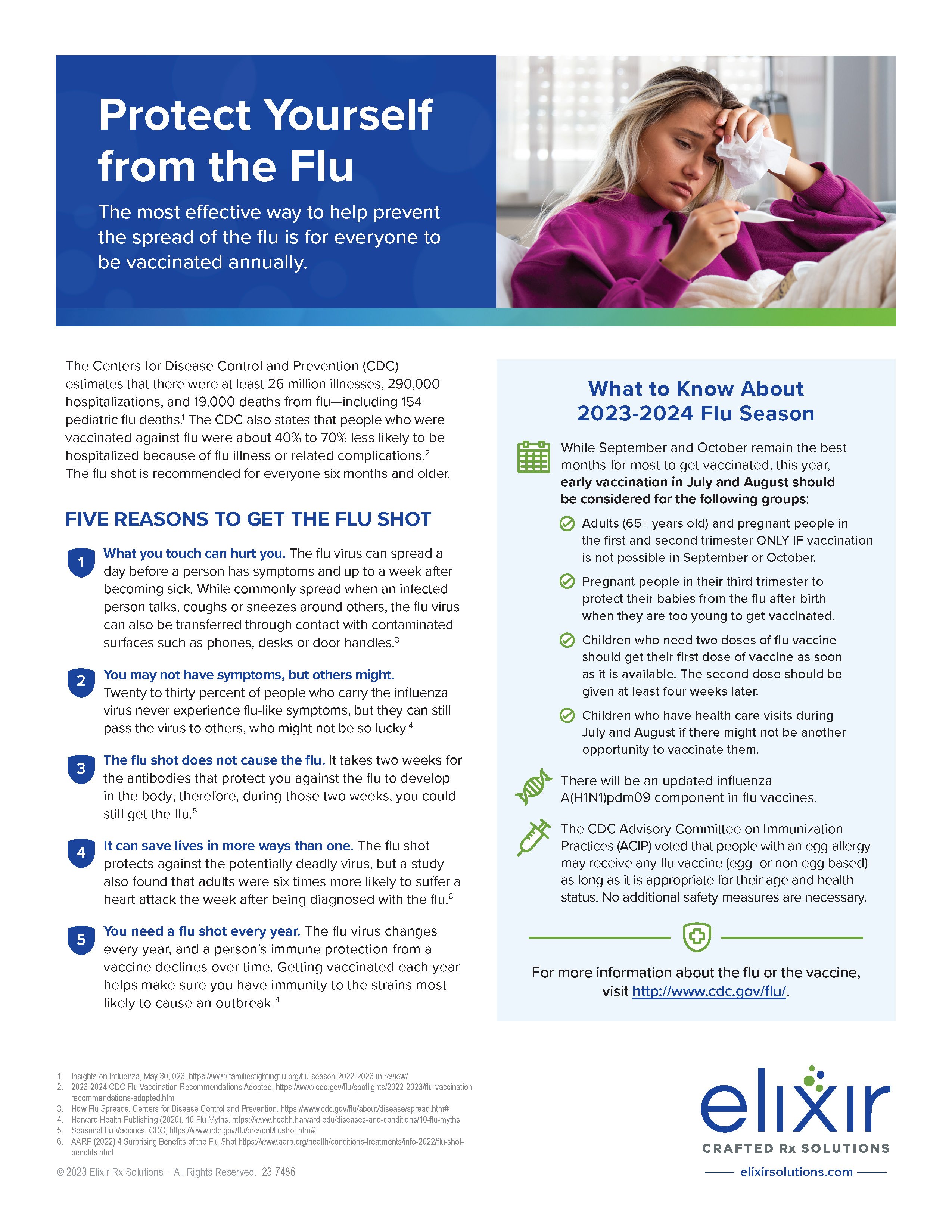According to the Centers for Disease Control and Prevention (CDC), there were as many as 14,000 flu-related deaths and an estimated 170,000 hospitalizations in the last flu season. [1] While COVID-19 is still active, it’s equally as important to take steps to prevent the flu.
Flu vaccines this season differ in regards to administration method, required number of doses and intended populations for use. Therefore, the choice of vaccine will depend largely on individual characteristics and may vary from person to person. However, NEW this year, the CDC’s Advisory Committee on Immunization Practices (ACIP) has recommended that those 65 years and older receive high-dose or adjuvanted flu vaccines instead of the standard flu vaccine. These include [2]:
- Fluzone High-Dose Quadrivalent vaccine – contains four times the amount of antigen as a regular flu shot, creating a stronger immune response
- Flublok Quadrivalent recombinant flu vaccine – contains three times the antigen dose compared to the standard-dose flu vaccines
- Fluad Quadrivalent adjuvanted flu vaccine – a standard dose flu vaccine with an adjuvant added to help create a stronger immune response
The CDC recommends getting the flu vaccine by the end of October. However, receiving a vaccine after October can still provide protection during the peak flu season. Additionally, it is OK to get a flu vaccine at the same time as a COVID-19 vaccine or booster shot. Plan sponsors who have members within a 25-mile radius of a Rite Aid can request a workplace flu clinic or voucher program to help your members get flu protection.
The best way to reduce the risk of the flu is to get vaccinated each year.
Here’s 5 reasons why:
What you touch can hurt you. The flu virus can spread up to one day before a person has symptoms and can be transferred when people talk or touch things, such as their phones, desks or door handles.[3]
You may not have symptoms, but your friends and family may not be as lucky. According to the Harvard School of Public Health, 20% to 30% of people who carry the influenza virus never experience flu-like symptoms, but they can still pass them on to others, who might not be so lucky.[4]
The flu shot does not cause the flu. It takes two weeks for the antibodies that protect you against the flu to develop in the body; therefore, if you are exposed to the virus within those two weeks, you could still get the flu.
It can save lives in more ways than one. Not only does the flu shot protect against the potentially deadly virus, a study found that adults were six times more likely to suffer a heart attack during the week after being diagnosed with the flu.[5]
Even if you don’t think you need it, you do. The Centers for Disease Control and Prevention (CDC) recommends that everyone over six months of age get a flu shot every year to protect themselves and others. The flu vaccination has been shown to reduce the risk of seeking medical care for the flu by 40 to 60%.[6]
Download and share this flyer with your members to help encourage flu shots.
It’s important that flu vaccination is encouraged to all over the age of 6 months. Prevention is key but there are new antiviral drugs that can be used to treat the flu. For more information about the flu or the vaccine, call 1-800-CDC-INFO or visit http://www.cdc.gov/flu/
[1] Centers for Disease Control and Prevention 2021-2022 U.S. Flu Season Preliminary Burden Estimates https://www.cdc.gov/flu/about/burden/preliminary-in-season-estimates.htm
[2] CDC, CDC Director Adopts Preference for Specific Flu Vaccines for Seniors, https://www.cdc.gov/media/releases/2022/s0630-seniors-flu.html
[3] Centers for Disease Control and Prevention. How Flu Spreads.
[4] Harvard Health Publishing (2020). 10 Flu Myths. https://www.health.harvard.edu/diseases-and-conditions/10-flu-myths
[5] Cleveland Clinic (2022). Can the Flu Trigger a Heart Attack. https://health.clevelandclinic.org/can-the-flu-trigger-a-heart-attack/#:~:text=Influenza%2Drelated%20stress%20on%20your,coming%20down%20with%20the%20flu
[6] Centers for Disease Control and Prevention. Benefits of Flu Vaccination. https://www.cdc.gov/flu/prevent/vaccine-benefits.htm


